As streaming services continue to grow in popularity, advertisers are on the lookout for inventive ways to target audiences.
One of which is the server-side ad insertion mechanism. It makes possible ad delivery to OTT viewers with no interruption.
But what is exactly the SSAI and in what ways can advertisers take the most of this technology?
In this detailed guide to SSAI for OTT, we will shed light on what the server-side ad insertion is all about.
SSAI has been shown to reduce ad buffering by up to 40%, ensuring a smoother viewing experience for audiences.
Over 70% of OTT platforms have adopted SSAI technology to improve ad targeting and delivery.
Studies show that SSAI-driven ads result in a 20% higher completion rate compared to traditional client-side ads.
By 2025, the SSAI market is projected to grow at a compound annual growth rate (CAGR) of 12%, reaching billions in revenue.
What is Server-side Ad Insertion (SSAI)?
Server-side ad insertion (SSAI) is a technology that allows for the seamless delivery of targeted ads to viewers of Over-the-Top (OTT) streaming services.
Unlike client-side ad insertion (CSAI), where ads are stitched together on the viewer’s device, SSAI inserts ads at the server level before the content is delivered to the viewer.
This enables a smoother viewing experience for the viewer and more accurate tracking and targeting for advertisers.
How Does SSAI Work?
SSAI works by dynamically stitching ads into the content stream before it is delivered to the viewer. When a viewer requests a video stream, the video player sends a request to the video server. The server then responds with a manifest file that contains information about the content, including where the ads should be inserted. The video player then requests the content, and the server stitches the ads into the content stream before delivering it to the viewer.
Are you ready to maximize your ad revenue with SSAI ?
Technical Process of Ad Stitching
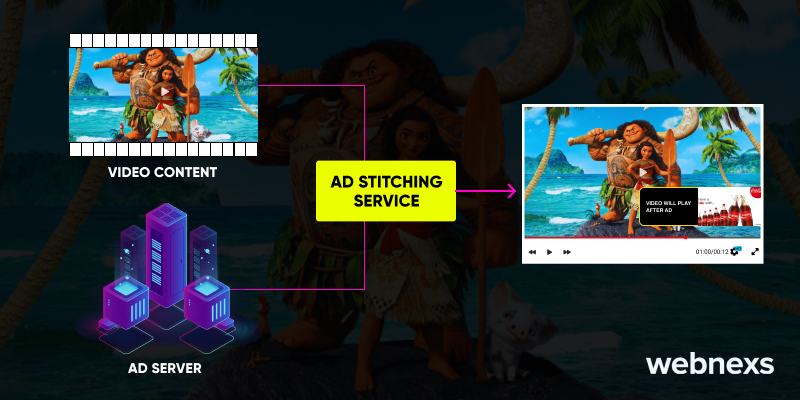
Ad Request:
After a user selects to play a video, the video player will send a request to the SSAI server, setting up the streaming session. This request layer includes significant metadata with user’s information including type of device, location, session ID, and when available, user preferences. SSAI server gets this data to make a decision which ads should be served to that particular user, thus a custom ad experience is implemented.
Ad Decision Server (ADS) Response:
Together with an Ad Decision Server (ADS), a SSAI scheduler is implemented to retrieve existing player ads. The ADS makes a decision on what will be shown to the viewer corresponding to the input data like user’s profile, age, browsing history, and ad goals of the advertiser. The reply from the ADS is very specific containing details including the ad creatives, lengths, formats and the tracking parameters. In the event that several advertisements are on the scene, the ADS through targeting rules, frequency capping, and bidding results will select the best ones for insertion.
Stitching Ads into the Stream:
After the appropriate ads have been picked, they are transcoded and encoded specifically to the video stream’s format and bitrate. Thus, ad content is in harmony with the integrity of the original video stream so that users can be engaged without disruption. The ads are subsequently stitched directly into the video stream at specific spots (pre-roll, mid-roll, or post-roll). This sewing process guarantees that the ads are downloaded without buffering no matter the viewer’s internet speed or device type.
Manifest Manipulation:
The SSAI server changes the HLS or DASH manifest file, which is the playlist that tells the player which video segments to play, thereby modifying the playlist instructions. The server inserts ad segments into the manifest as part of the stream. In such a manner, the player looks at the ads as part of the main content, which guarantees smooth flows from the ads to the video. The altered manifest is used for a seamless experience on devices and platforms, it also restricts ad-blockers to interfere with streams that they identify as advertisements.
Tracking and Reporting:
The SSAI server includes tracking pixels and beacons in the ad content. These are used to track various data such as CTR, impressions, completion rates, and other engagement information. The tracking is based on the server, which is a threat to fewer ad blockers, so they cannot be seen. The real-time tracking data is sent to the ad server and analytics platforms to give a detailed report on campaign performance to the advertisers. SSAI further means that viewability and completion rates are recorded accurately, thus increasing attribution and ad efficiency.
SSAI for Live vs. On-Demand (VOD) Content
Live Streaming:
Ad films are enjoined dynamically to the live stream thus, it becomes in real-time, it is adjusting itself with the demographics of the users. There is a real problematic situation when it comes to high-speed and quality broadcasting of the show without any interruptions, which needs to be overcome here.
VOD Content:
VOD‘s pre-recorded content provides a lot more freedom because the ads can be personalized depending on a person’s profile or where he/she lives. The Streaming and Stitched Ad Injection feature helps to switch from the ad to the movie giving an unobstructed view to the VOD user.
Need a better way to monetize your videos?
Protocols Used: HLS, DASH, etc.
HLS (HTTP Live Streaming):
This one is an adaptive streaming protocol, similar to the one mainly used by Apple devices, which also divides content into small subparts that are the method through which SSAI lists ads in between. Thus it provides for smooth transitions between movie and ad.
DASH (Dynamic Adaptive Streaming over HTTP):
As time passes, DASH is finding its position by having a similar operation to HLS and broadening its attribute into the aspect of support across devices and platforms. SSAI takes advantage of DASH to synchronize ads automatically along with the video playback.
RTMP (Real-Time Messaging Protocol): RTMP was one of the first protocols used for live streaming that also allowed for ad insertion, although it is not commonly used nowadays.
Benefits of SSAI for Advertisers
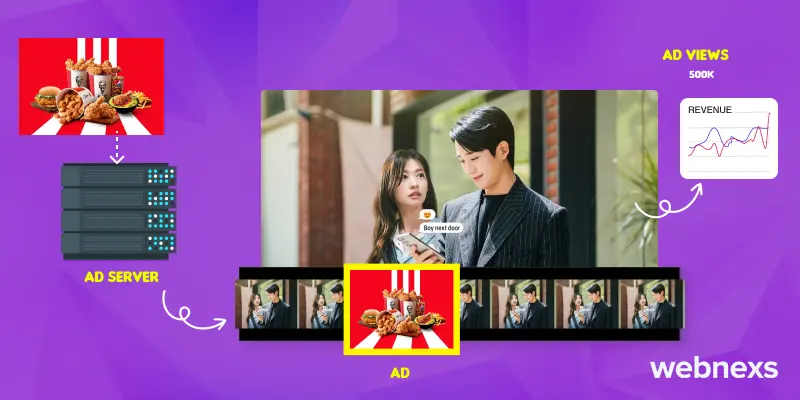
Improved User Experience
SSAI integrates ads subtly into the video streaming process, thus allowing smooth streaming without buffering, or lag and giving viewers an uninterrupted viewing experience. The seamless transition gives viewers the impression that ads are also part of the content and reduces the possibility of viewer dissatisfaction or abandonment.
Reduced Ad-Blocking
The advertisements are now being pushed server-side into the video stream which has made them become indistinguishable from the content itself. As a result, SSAI greatly increases the effectiveness against ad blockers that allows the advertisers to transmit their messages.
Accurate Tracking and Targeting
SSAI provides accurate data by server-side tracking, including impressions, engagement, and conversions. Along with ad decision servers (ADS), advertisers can profile users by location, behavior, or device as the basis of hyper-targeting which means, ads are more personalized and thereby more effective.
Platform and Device Compatibility
SSAI corresponds with various transport protocols like HLS and DASH ensuring compatibility with multiple devices (smart TVs, mobile phones, tablets) and platforms. The portability of an ad is one of the characteristics that makes its potential to reach greater heights and advertisers can now interact with their audience regardless of the gadget or environment the user chooses.
Higher Engagement and Completion Rates
The SSAS uninterrupted nature improves the chances of users’ continued interaction and the ultimate scoring of the advertisements. By using proper and well-integrated ads, advertisers receive higher engagement and the campaign’s response rates are more open, resulting in a better return on investment.
Struggling with ad buffering issues?
Challenges of SSAI for Advertisers
While server side ad insertion offers many benefits for advertisers, there are also several challenges that must be addressed in order to maximize the effectiveness of this technology. In this article, we’ll explore some of the main challenges of SSAI for advertisers and how they can be overcome.
Limited Real-Time Targeting and Frequency Capping
The Server-Side Ad Insertion technology relies on pre-stitching which poses a challenge to real-time targeting, compared to client-side ad insertion which is possible in real-time. More challenging too is managing frequency capping from one device to another due to no smooth procedure of data synchronization.
Complicated Analytics Integration
Correct tracking of SSAI can be done through very specific server-side reports. Implementing analytics tools for impressions, clicks, and engagement might also be very intricate especially in the coordination with third-party measurement platforms to achieve consistent metrics.
Large Initial Implementation Costs
The necessary equipment for SSAI purposes, like transcoding services and ad decision servers, is often high in cost. These system setups and running them require big funds, particularly from platforms handling huge contents of video.
Ad Blocking
However, SSAI is resistant to ad blockers, ad-blocking technologies (computers ad blockers) might still manage to find some loopholes in tracking and reporting giving advertisers the wrong results on their productivity.
Ad Fraud
SSAI is attacked by cybercriminals who fake web traffic that will increase bots driving impressions and clicks inflate the metrics as a result. Apart from that, attackers may seek loopholes in the SSAI system to insert unauthorized ads despite the absence of tracking processes.
Ad Latency
In some cases, stitching ads into live streams may introduce slight latency, especially if ads are not preloaded efficiently. Even small delays can affect the viewer experience, particularly in live sports or real-time broadcasts.
Ad Quality
If ads are not transcoded correctly to align with the video stream’s quality, there might suddenly appear a visual defect and audio invariability. Compliance with ad quality standards among the complexity of existing devices and network infrastructures can be highly technical.
Targeting and Measurement
As SSAI incorporates the ad directly into the stream, internal audience segmentation and precise measurement can be more challenging. To trace user behavior in different sessions and platforms may turn the profile into a less detailed one and thus, the effectiveness of personalized campaigns.
Why Would I Use SSAI?

Ideal Use Cases for SSAI
Live and Linear Streaming:
SSAI allows online videos to be played without interruption with level streaming, thus ads can be delivered at the proper time without buffering and engaging viewers.
OTT Platforms:
SSAI is largely deployed in OTT platforms ensuring the successful ad delivery experience in case of network variations like dynamic or static conditions and the number of devices.
Ad Blocker Resistance:
For advertisers who are struggling with client-side ad blockers, SSAI is a useful tool to overcome the blockers and thus deliver an ad.
Personalized Ads:
SSAI is useful in broadcasts where it is users-oriented content that is being displayed, and the insertion will not be noticed by the video viewers, especially with VOD services. / Personalization through
Cross-Platform Campaigns:
SSAI provides compatibility on different devices’ platforms like smart televisions, mobile applications, and web browsers, making it perfect for campaigns that will be expanded to cover as many as possible devices.
SSAI’s Role in Live Sports and OTT Streaming
Live Sports Streaming:
The server-side ad insertion will ensure that every ad video will be played in real-time only in breaks, such as halftime or timeouts, without the game’s stillness to mess up the game show. It is very imperative to the viewers who the streaming keeps limitlessly etcetera stay immersed in their preferred channel.
OTT Streaming Services:
Due to the advent of these platforms, server-side ad insertion makes advertising the content the OTT platforms show very smooth both in the live and on-demand format. OTT providers have the flexibility to show a particular region or an ad bespoke to the viewer, which in turn ratchets up the monetization capacity.
What is CSAI?
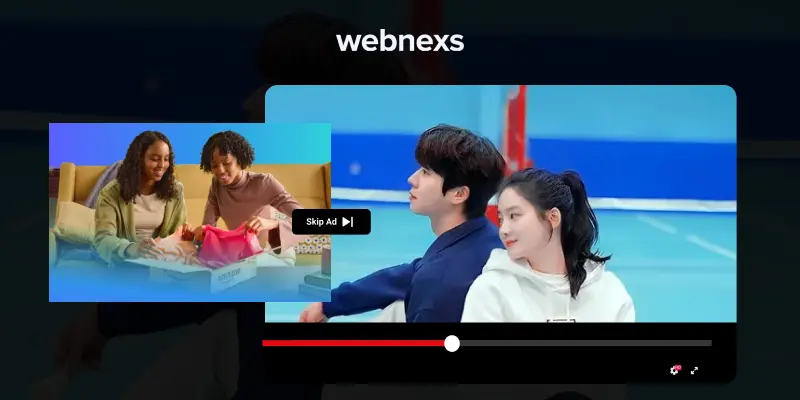
Client-Side Ad Insertion (CSAI) is an approach through which ads are inserted by a user’s device (client) and appear like any other video during the video playback. From instance to CSAI, the player’s video stream will make a request to the ad server, and the latter will perform the actions of loading and playing the requested ads. This technique is helpful if there is a real-time need for low latency but, on the other hand, it is easier for issues such as buffering and ad blocking to occur.
SSAI vs CSAI: Key Differences
CSAI vs SSAI represents two distinct ad delivery methods in streaming services. CSAI involves stitching ads together on the viewer’s device, while server-side ad insertion inserts ads at the server level before the content is delivered to the viewer. While CSAI can be more cost-effective and support more ad formats, SSAI offers a smoother viewing experience and more accurate tracking and targeting.
Performance and Ad Personalization
SSAI: The commercials will be seamlessly integrated into the stream from the server side and a smooth, unconstricted experience will be one of the benefits to the customers but the customization will be limited due to the pre-insertion process.
CSAI: The Ads are delivered to the users in real-time without a latency gap, thus, it allows the users to have hyper-targeted positive experiences based on the customer’s behavior, location, and session data.
Ad-Blocking Resistance Comparison
SSAI: Ads are incorporated into the video stream and they become indistinguishable from the main content, so the ad blockers become more resistant to SSAI.
CSAI: It is open to ad blockers as the ads are loaded separately by the client and therefore, the blockers can easily catch and block them.
Latency and Viewing Experience
SSAI: The whole process is done without interruption, as there is just a little buffering with the ads being inserted into the stream. Nevertheless, live content sometimes might face minor latency problems during ad insertion while causing mild disturbances in the stream.
CSAI: The involvement of ads during the playback, which are fetched and loaded separately, may cause viewers to experience delays and buffering, thus leading to a ruptured viewer experience.
Security and Compliance in SSAI
Protecting Against Ad Fraud
SSAI platforms can deal with ad fraud by means of verifying requests on the server side, thus making it more difficult for the bots to create fictitious impressions. SSAI also provides better chances to manage ads and track ads hence decreasing the risk by preventing unauthorized or devilish ads from appearing.
Compliance with GDPR, CCPA, and Other Regulations
SSAI platforms must adhere to data privacy regulations like GDPR (Europe) and CCPA (California) in order to operate. In contrast, SSAI not only moves the ad experience to an exciting level, but also, regulates user data collection, processing, and storing under the right privacy laws. Meanwhile, transparency in consent mechanisms and data anonymization are strong tools for regulatory compliance that at the same time allow enhanced ad targeting.
Best Practices for Optimizing Your Server-side ad insertion(SSAI) Strategy
To make the most of server side ad insertion for OTT advertising, advertisers should consider the following best practices:

Reducing Latency in Ad Delivery
The smooth functioning of the stream in a live show by the ad preloaded sincerely and the ad breaks being scheduled well will prevent the video from buffering. Using Low-Latency streaming protocols such as HLS Low-Latency, allows the user to receive ads faster.
Leveraging CDNs for Better Performance
CDNs or Content Delivery Networks make faster access to video files by distributing their copies across servers closer to users thereby reducing download times and buffering. Reliable CDNs boost the ability to display ads smoothly even in a period of high traffic.
Choosing the Right Ad Formats
Ad formats that are preferred by your target audience and work in harmony with your content should be utilized. Mid-rolls are highly effective for longer pieces while pre-rolls serve to capture the attention on shorter videos. Moreover, the delivery mechanism should remain in sync with viewer satisfaction.
Work with Reputable Providers
Collaborating with well-known server-side ad insertion providers assures the best ad insertion, compatibility, and privacy law compliance. Safe options for data from companies also provide the ability to get detailed statistics for ad performance.
Optimize Ad Creative
Creative and high-quality advertisements are very important for viewer satisfaction. Make sure that the ad fits the platform and device being used so it does not have any resolution or format problems.
Target Effectively
With the use of first-party data and ad decision servers (ADS), personal ads can be targeted. Target based on the location, demographics, and behavior of individuals to obtain more engagement and relevant suggestions.
Measure Performance
Put in place close tracking systems to examine impressions, completion rates, and click-through rates (CTR). The calculation of KPIs helps determine which strategies are the most effective for future optimization.
Targeting and Personalization in SSAI
One of the key benefits of server-side ad insertion is its ability to enable more precise targeting and personalization of ads. Advertisers can use data like viewing behavior and demographics to target ads to the right audience, and can also use dynamic ad insertion to personalize ads based on factors like location and time of day.
Using Metadata for Audience Segmentation
Metadata from users can be a technique to segment an audience into groups based on physical location, behavior, or device. Metadata makes it possible to run targeted ads while still respecting data protection laws.
Overcoming Targeting Challenges in Server-side ad insertion(SSAI)
Use server-side data aggregation to deal with the issues of having limited real-time targeting. Coordinate with methods called Demand-Side Platforms (DSPs) to conduct ad campaigns on several devices and sessions.
Ad Performance Measurement & Attribution in SSAI
Server-to-Server vs. Client-Side Tracking
Server-to-Server Tracking:
S2S is a relatively secure and ad click-through rate-protected but may miss more detailed data.
Client-Side Tracking:
It provides data of high granularity that persuades the electronic businesses to client interaction however it is too susceptible to ad blockers. Blending both can make the relationships between the results clear-to-order.
Tools for Measuring Ad Impact
Platforms such as Google Analytics, Moat, and Comscore are helpful in measuring ad engagement and ad impact. Moat helps you to discover the interactions, their completion percentages, viewability, and conversions that occurred on account of your advertising.
Challenges in Viewability Tracking
Programmatic Video Streaming can be viewed as a media traffic acquisition strategy by SSAI (Looks in ambiguity), thus utilizing a programmatic viewability metric for the rating can cause some possible advertisers confusion. Beacon or limit server-side tracking pixels implementation will help strengthen visibility metrics.
Measuring Success with Server-side ad insertion(SSAI)
To measure the success of your server-side ad insertion strategy, it’s important to track key metrics like completion rate, viewability, and engagement. By analyzing these metrics, you can identify areas for improvement and make data-driven optimizations to your strategy.
Key Performance Indicators (KPIs) to Track
- Display Count
- Ad Completion Rate
- Click-Through Rate (CTR)
- Return on Ad Spend (ROAS)
- Engagement Metrics (likes, shares)
A/B Testing for Ad Optimization
A/B test is the best practice to understand what types of ads or ad placements work for different audiences. Out of the test, we are able to identify which ads connect best with the audience which results in higher engagement.
Top SSAI Providers List in 2023

Server-side ad insertion is a crucial technology for OTT content providers looking to monetize their content through advertising. By seamlessly stitching ads into content, server-side ad insertion ensures a smoother viewing experience for viewers while maximizing revenue for content providers. In this article, we’ve compiled a list of the top server-side ad insertion providers in 2023.
Webnexs
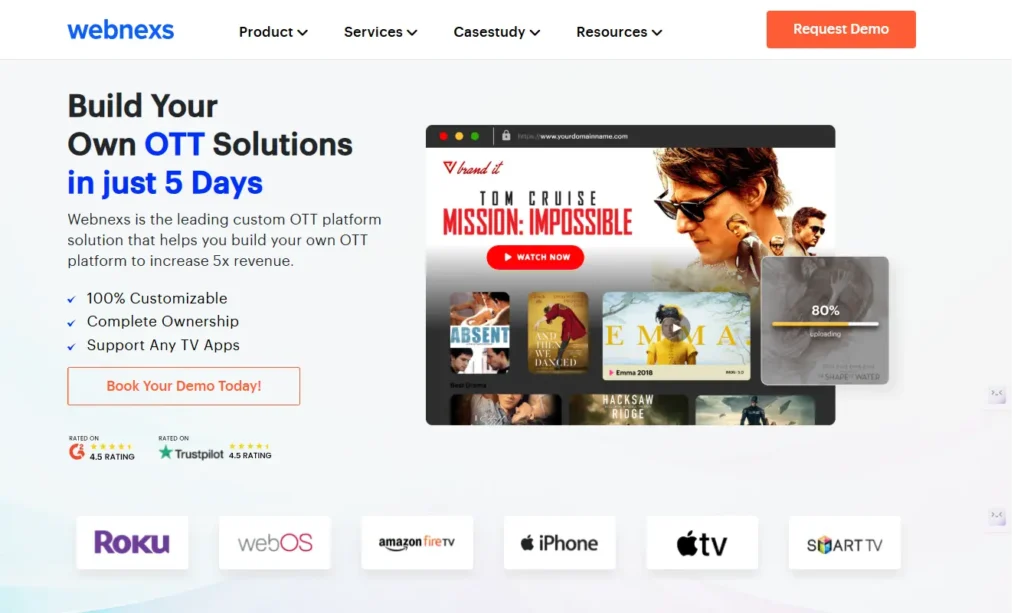
Webnexs offers a powerful server-side ad insertion solution with advanced ad targeting and measurement capabilities. With support for a wide range of ad formats and customizable ad pods, Webnexs is a great choice for providers looking to maximize their ad revenue.
Features:
- Smart ad targeting with real-time tracking
- Multiple formats of ads supported (pre-roll, mid-roll, post-roll)
- Customizable ad pods for augmented monetization
- Integration of CDN for seamless streaming
- Analytics tools to measure ad performance
Pros:
- Real-time analytics that allow for campaign fine-tuning
- Highly scalable infrastructure for both VOD and live streaming
- High level of customization for ad pods
Cons:
- Complex technical configuration is necessary
- Less third-party expansion compared to the big brands
Flicknexs
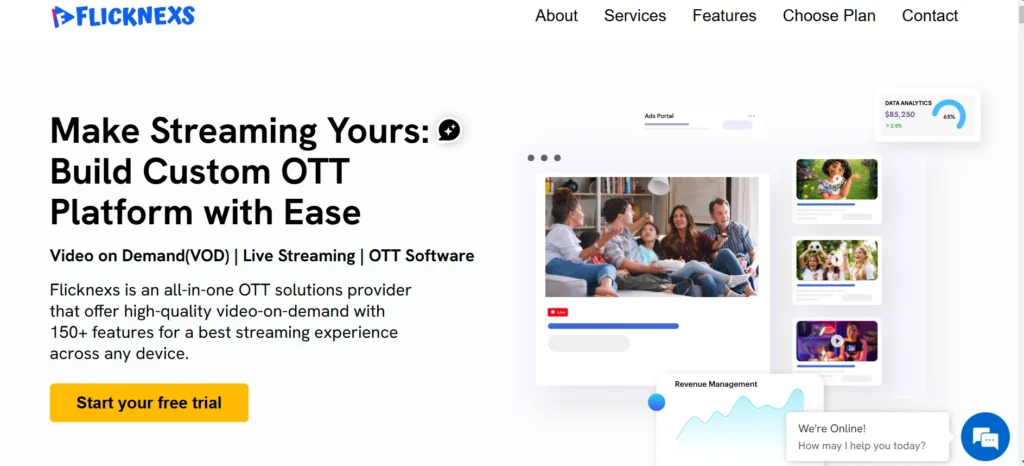
An SSAI solution from Flicknexs delivers a smooth viewing experience, comprehensive measurement capabilities, and compatibility for a variety of ad formats, allowing providers to boost ad revenue.
Features:
- Real-time tracking and smart ad targeting.
- Ad formats (pre-roll, mid-roll, and post-roll) are supported.
- Adaptable ad pods for increased revenue.
- Incorporating CDN to provide smooth streaming.
- Ad performance is measured via analytics technologies.
Pros:
- Campaign fine-tuning with real-time analytics.
- Infrastructure for live streaming and VOD that is extremely scalable.
- Extensive personalization for ad pods.
Cons:
- It requires a complex technical configuration.
- Less expansion by third parties than the major brands.
Comcast Technology Solutions

Comcast Technology Solutions offers a comprehensive server-side ad insertion solution with advanced ad targeting and measurement capabilities. With a range of ad formats and customizable ad pods, Comcast Technology Solutions is a great choice for providers looking to optimize their ad strategy.
Features:
- Dynamic ad insertion through the use of adaptive streaming,
- Incorporate ads from various ad exchanges for programmatic purposes
- Extensive analytics dashboard for performance measurement purposes.
- Flexible ad delivery for both live broadcasting and on-demand viewing
Pros:
- Superior scale for massive OTT providers
- Perfectly matched with the majority of big ad networks
- Live streaming events receive a great deal of backing
- Pricing is relatively higher when compared to smaller providers.
Cons:
- Limited customization options can make it challenging to tailor the platform precisely to specific needs.
- The pricing structure may be expensive for small to mid-sized businesses.
- Customer support response times can sometimes be slower during peak periods.
Google Ad Manager

As one of the largest ad networks in the world, Google Ad Manager offers a robust server-side ad insertion solution with advanced targeting and measurement capabilities. With a wide range of ad formats and a user-friendly interface, Google Ad Manager is a top choice for many OTT providers.
Features:
- Remarkable targeting based on users’ behaviors and geographic location
- Along with a wide range of ad types, it also supports interactive ads.
- Ad automation for programmatic ad buying which increases the level of monetization
- Enables the smooth channels of the manufacturer’s interface.
Pros:
- Powerful advertisement network the whole globe can access.
- The part of the Google Network that did not fail to deliver (e.g. Analytics).
- Tools for GDPR and CCPA compliance
Cons:
- Very steep learning curve for novices.
- Completely saturated with Google’s ecosystem.
Amazon Web Services (AWS) Elemental

AWS Elemental offers a scalable server-side ad insertion solution that can handle even the largest video libraries. With advanced targeting and measurement capabilities, as well as support for a wide range of ad formats, AWS Elemental is a popular choice for many OTT providers.
Features:
- Cloud centric technology with multi-bitrate streaming
- Flexible pay-as-you-go pricing model
- Live events and large video libraries come with a built-in feature.
- Native integrations with AWS tools enable easy analytics
Pros:
- Highly reliable system with zero and almost minimal downtime
- Best for large-scale live sports OTT services and sporting.
- Flexible pricing option
Cons:
- If your organization is not proficient with AWS technology, it might be quite cumbersome.
- Some features that are qualified as premium have their price higher.
Brightcove

Brightcove offers a powerful SSAI solution with advanced ad targeting and measurement capabilities. With support for a wide range of ad formats and customizable ad pods, Brightcove server-side ad insertion is a great choice for providers looking to optimize their ad strategy.
Features:
- The interactive ad format that facilitates better user involvement.
- Creation of ad pods and targeting tools as well as a flexible solution is possible
- Low-latency streaming makes sure that playback is uninterrupted.
- Applicable for both VOD and live content
Pros:
- Easily scalable to handle large video libraries and high viewer traffic.
- Provides flexible monetization options, including subscriptions, ads, and transactions.
- Delivers advanced analytics for insights into audience behavior and content performance.
Cons:
- Premium pricing might not be a good option for small providers.
Verizon Media Platform

Verizon Media Platform offers a comprehensive server-side ad insertion solution with advanced targeting and measurement capabilities. With a range of ad formats and customizable ad pods, Verizon Media Platform is a great choice for providers looking to maximize their ad revenue.
Features:
- Multi-layered security against ad fraud
- Dynamic ad placement depending on network conditions.
- CDN integrated with real-time analytics.
- Supports a variety of ad formats and pods
Pros:
- Robust security measures to ensure brand safety
- Committed to meeting video streaming demands for both live and on-demand content
- Seamless additions to the already existing networks
Cons:
- High startup costs
- Limited personalization options as compared to the competition
JW Player
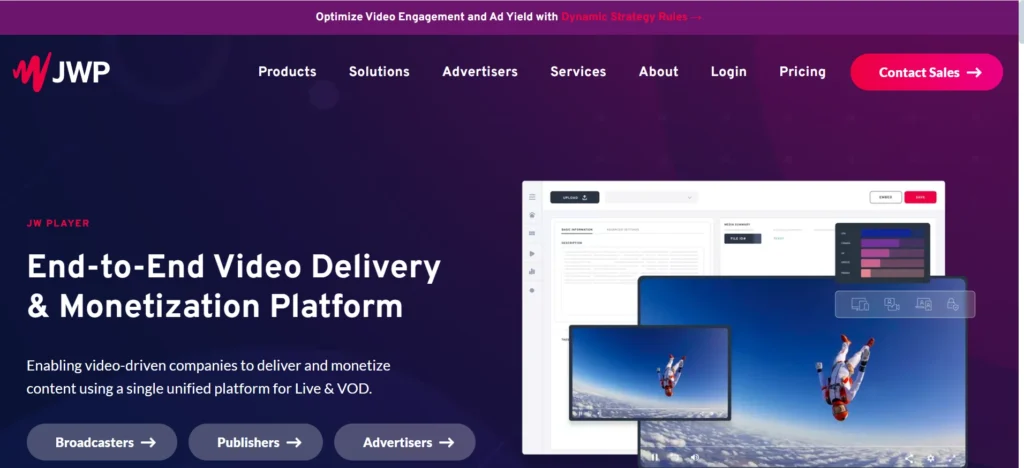
JW Player offers a robust server-side ad insertion solution with advanced targeting and measurement capabilities. With support for a wide range of ad formats and customizable ad pods, JW Player is a popular choice for many OTT providers.
Features:
- Interactive and skippable ads
- AI-enabled analytics tools for deep performance insights
- Cross-platform compatibility for seamless delivery
- Precision measurement with server-to-server tracking
Pros:
- Easy to use and deploy across multiple platforms
- AI-powered analytics for more effective marketing
- It is also compatible with the smaller OTT services
Cons:
- Not enough personalization features for major providers
- Ability to access additional features might necessitate extra payment
Kaltura
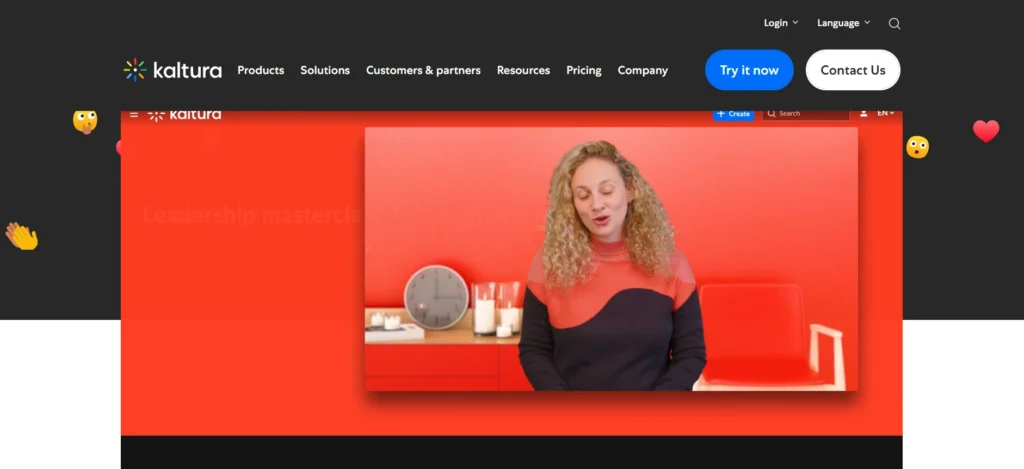
Kaltura offers a comprehensive server-side ad insertion solution with advanced targeting and measurement capabilities. With a range of ad formats and customizable ad pods, Kaltura is a great choice for providers looking to optimize their ad strategy.
Features:
- Advertising in multiple languages for worldwide dissemination
- Integration with Demand-Side Platforms (DSPs) and Programmatic Exchanges
- Campaign monitoring inComplies with privacy regulations
Pros:
- Highly customizable for diverse branding needs across industries.
- Offers detailed video analytics to track viewer engagement.
- Supports flexible monetization models like subscriptions, pay-per-view, and ads.
Cons:
- Complex setup may require technical expertiseHigher spending for smaller
- Complies with privacy regulations
- Complex setup may require technical expertise
- Higher spending for smaller
Mux
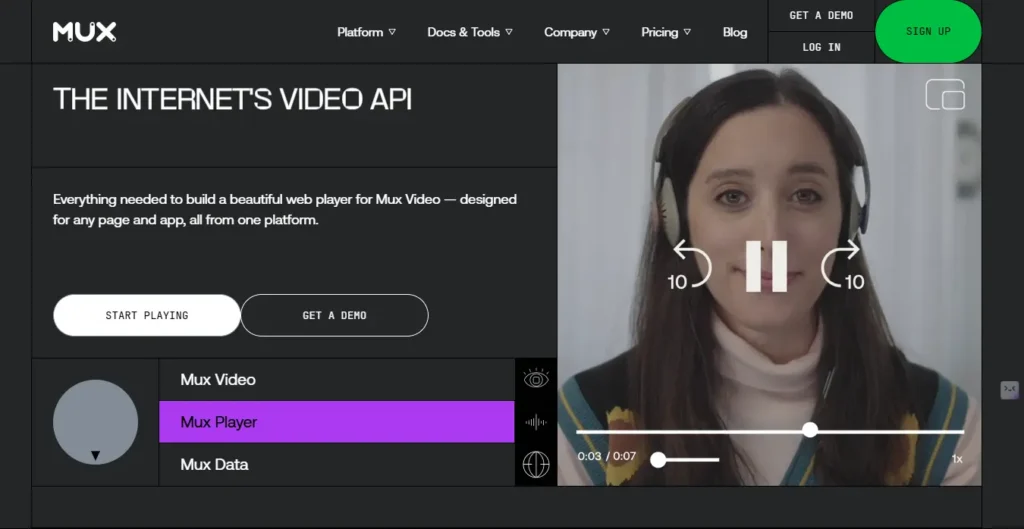
Mux offers a powerful server-side ad insertion solution with advanced ad targeting and measurement capabilities. With support for a wide range of ad formats and customizable ad pods, Mux is a popular choice for many OTT providers.
Features:
- Video with multiple bitrates and seamless ad inclusion
- A Developer-friendly API for extending integrations
- Real-time performance monitoring tools
- Scalable Infrastructure for VOD and Live content distribution.
Pros:
- Behind-the-scenes integration with other software
- Granulated ad performance data for marketing success
- Excels at scalability during periods of emerging OTT services.
Cons:
- Such limiting customer support alternative to larger companies
- Certain features of the system are very complex and may necessitate technical knowledge
Are you planning for seamless ad insertion to boost engagement?
Monetization Models Enabled by Server-side ad insertion(SSAI)
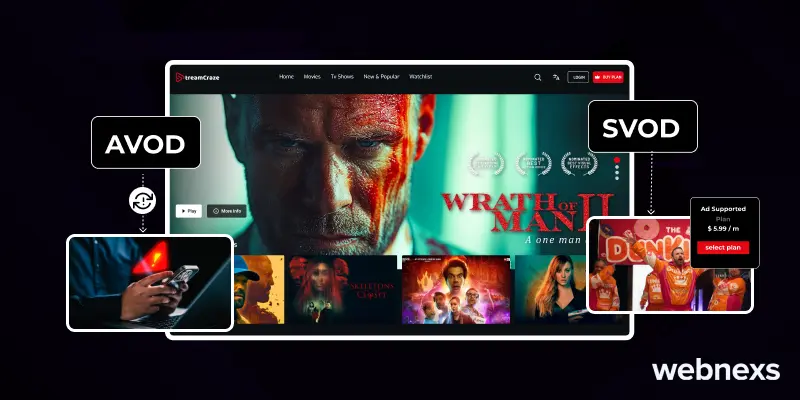
SSAI in AVOD, SVOD, and Hybrid Models
AVOD (Ad-Supported Video on Demand):
SSAI allows inserting ads in a fully synchronized manner to free content, which serves the purpose of monetization.
SVOD (Subscription-Based VOD):
Server-side ad insertion can bring some relief to users who want cheaper subscription options through ad-supported subscriptions.
Hybrid Models:
Platforms like Hulu use SSAI to incorporate ad-supported content and various subscription tiers, thus, growing revenue streams.
Real-Life Examples (e.g., Hulu, Pluto TV)
Hulu: The server-side ad insertion The Ad-Inclusive Experience and Premium Memberships Set Help SSAI the Transparency as Well.
Pluto TV: SSAI is used for ad insertion in free-to-view linear and on-demand content.
Future of Server-side ad insertion(SSAI)
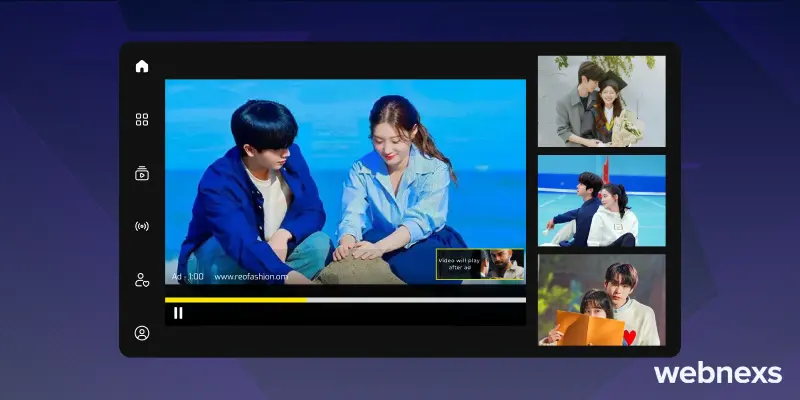
As OTT streaming services continue to grow in popularity, server-side ad insertion is likely to become an increasingly important tool for advertisers looking to reach audiences in a seamless and effective way. Advancements in technology, such as the adoption of server-side ad stitching (SSAS), may further improve the accuracy and efficiency of server-side ad insertion in the future.
Growth in OTT and CTV Platforms
Following more viewers shifting from traditional TV to OTT and Connected TV (CTV) platforms, the expected demand for server-side ad insertion seems to be on the rise. SSAI is the perfect tool for ensuring fluid ad delivery on these proliferating platforms.
AI and Machine Learning in SSAI
AI deployed server-side ad insertion is capable of better personalizing ads and consequently enhancing target accuracy in predicting what users like by capturing the user’s real-time choices.
Interactive and Shoppable Ads
The server-side ad insertion strategies, of the future, could include interactive and shoppable ads by the fact that viewers will be able to directly interact with the ads and even shop without leaving the streaming platform.
Want to optimize your streaming ads for better performance?
Conclusion
Server-side ad insertion is a powerful tool for advertisers looking to reach audiences on Over-the-Top (OTT) streaming services. By enabling seamless ad delivery and more accurate tracking and targeting, server-side ad insertion can help advertisers improve their ad experiences and increase revenue. To make the most of SSAI, advertisers should follow best practices like working with reputable providers, optimizing ad creative, and measuring performance. As streaming services continue to grow in popularity, server-side ad insertion is likely to play an increasingly important role in the world of OTT advertising.




10 Responses
benefits of SSAI for their OTT advertising campaigns. It provides a thorough and comprehensive guide to the technology, making it an essential read for anyone interested in this area of advertising.
Blog is written in a clear and concise manner, making it easy for readers to understand the technical aspects of SSAI. It is well-organized, with helpful diagrams and examples that further enhance readers’ understanding of the topic.
The blog provides some useful insights into the challenges that advertisers may face when implementing SSAI in their campaigns, such as ad blocking and audience fragmentation. It also discusses the impact of SSAI on ad metrics, such as completion rates and click-through rates, and provides tips for optimizing these metrics for maximum effectiveness. Additionally, it highlights how choosing the right SSAI vendors can help overcome these challenges and improve ad performance.
The blog is an excellent resource for advertisers looking to understand SSAI and its potential benefits for their OTT advertising campaigns. It is well-written, informative, and easy to understand, making it a valuable read for anyone interested in this topic. Additionally, it provides great insights for those exploring SSAI vendors to enhance their ad delivery and monetization strategies.
The blog also offers a step-by-step guide to the Server-Side Ad Serves process, including ad request and insertion, and discusses the different types of ad formats that can be used with SSAI. It also delves into the impact of SSAI on advertising metrics and provides some tips for advertisers looking to implement SSAI in their campaigns.
The article provides a comprehensive guide to Server-Side Ad Insertion (SSAI) for OTT advertising, explaining how it works, its benefits, and challenges faced by advertisers. It highlights the differences between SSAI and Client-Side Ad Insertion (CSAI) and explains how SSAI can improve ad viewability and user engagement. Additionally, it offers insights into choosing the right SSAI vendors to ensure seamless ad delivery and monetization.
The blog is a comprehensive guide to SSAI for OTT advertising, providing valuable insights and information for advertisers looking to leverage this technology to enhance their advertising campaigns.
The blog also explores the impact of SSAI on advertising metrics, such as ad completion rates and click-through rates, and provides some tips for advertisers looking to implement SSAI in their campaigns.
Blog provides a step-by-step guide on how SSAI works, from ad request to ad insertion, and also discusses the different types of ad formats that can be used with SSAI.
The article then highlights the benefits of ssai advertising, such as better ad viewability and higher user engagement, as well as the challenges faced by OTT advertisers, such as ad blocking and audience fragmentation.